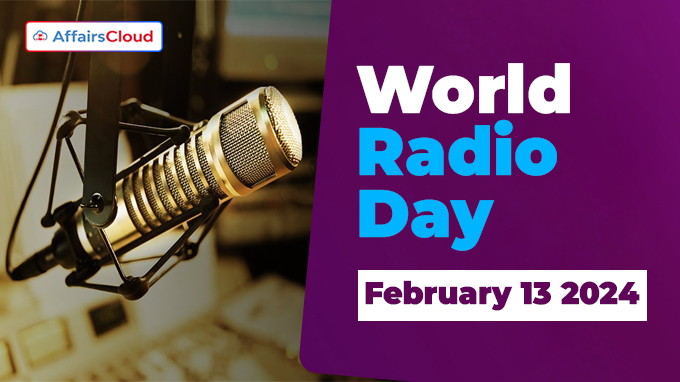 The United Nations (UN) World Radio Day (WRD) is annually observed across the globe on 13 February to celebrate Radio as a powerful and low-cost medium and to promote its role in fostering international collaboration among broadcasters.
The United Nations (UN) World Radio Day (WRD) is annually observed across the globe on 13 February to celebrate Radio as a powerful and low-cost medium and to promote its role in fostering international collaboration among broadcasters.
- 13 February 2024 marks the observance of the 13th WRD.
The theme of World Radio Day 2024 is “Radio: A century informing, entertaining and educating”.
Background:
i.In 2011, the member states of United Nations , Scientific and Cultural Organization (UNESCO) at its 36th session of the General Conference adopted a resolution and proclaimed the 13th February of every year as WRD, to mark the establishment of UN Radio.
- The resolution was adopted following the request proposed by the Spanish Radio Academy, Spain in 2010.
ii.In December 2012, the UN General Assembly (UNGA) adopted the resolution A/RES/67/124 and endorsed the resolution of UNESCO on WRD.
iii.The first edition of WRD was observed on 13 February 2012.
Note: UNESCO is the Chair of the informal International World Radio Day Committee.
Why February 13?
i.The date 13 February marks the anniversary of the creation of the UN Radio Service “UN Radio” (UNR) in 1946.
ii.The observance of WRD on 13th February was proposed by Julian Huxley the first Director-General of the UNESCO (1946-1948).
2024 Observance:
i.The 2024 observance emphasises the century-long historical significance of radio in news, drama, music, and sports.
ii.The 2024 observance commemorates the centenary of the inaugural live radio broadcast of the Olympic Games.
iii.UNESCO invites the diverse global radio industry, commercial, public, and non-profit, to join the World Radio Day celebration.
iv.UNESCO provides a platform for stations, networks, and shows to engage in programming partnerships, fostering a dynamic and interconnected global radio community.
Note: UNESCO coordinates WRD events at a global level, UN member countries, through their radio stations and media stakeholders.
About Radio:
i.Italian inventor Guglielmo Marconi first developed the idea of a radio, or wireless telegraph, in the 1890s. He is known as the father of radio.
ii.In 1897, he sent the world’s first radio message across open water.
iii.In 1909, Marconi was jointly awarded the Nobel Prize in physics with the German radio innovator Karl Ferdinand Braun in recognition of their contributions to the development of wireless telegraphy.
About UN Radio (UNR):
i.The first official broadcast from the UNR was on February 13, 1946. The call sign was “This is the United Nations calling the peoples of the world”.
ii.Initially, the programs in the UNR were broadcast in 5 official languages: English, French, Chinese, Russian, and Spanish – later followed by Arabic.
iii.By 1950, UN Radio was broadcasting in 33 languages, and in 1980, UN peacekeeping missions started launching their radio stations.
2024 Events:
Audios 2024:
In celebration of WRD 2024, UNESCO released 20 audio files of one minute each, which allows for broadcasting, sharing, and usage without the burden of copyright restrictions.
Union Minister Anurag Singh Thakur Releases Revised Policy Guidelines for CRS in India
On the occasion of WRD 2024, Union Minister Anurag Singh Thakur, Ministry of Information and Broadcasting (MIB) unveiled revised policy guidelines to enhance the setup of Community Radio Stations (CRS) in India.
- The guidelines were released during the 2-day Regional Community Radio Sammelan (South) at Anna University, Chennai , Tamil Nadu.
Note:
- The 2-day Regional Community Radio Sammelan for southern CRS’ also commemorated the completion of 20 years of Community Radio in India.
- Currently, there are 481 CRSs’ in India, and in the last 2 years, over 133 CRSs’ have become operational.
Key Guidelines:
i.Increased Advertising Benefits: The advertising rate was raised to Rs. 74 per 10 seconds and the advertising time was extended to 12 minutes per hour.
ii.Gender Inclusivity: 50% of Advisory and Content Committee members will be women.
Revised Policy Guidelines:
i.Eligible organisations operating in multiple districts can establish a maximum of 6 CRS’ in different districts, subject to fulfilling specific conditions.
ii.The initial period for the ‘Grant of Permission Agreement’ was extended to 10 years.
iii.The validity of the Letter of Intent (LoI) issued to an organisation has been set at 1 year with a 3-month buffer for unforeseen circumstances.
iv.A fixed timeline for the entire application process has been introduced.
Community Radio Stations (CRS):
i.CRSs are low-power Radio Stations, which are distinct from Public service Radio broadcasting and Commercial Radio, and are meant to be set up and operated by local communities.
ii.In the broadcasting hierarchy, it has been uniquely positioned as 3rd tier alongside public and private radio, to address the needs of marginalised communities.
About Ministry of Information and Broadcasting (MIB):
Union Minister– Anurag Singh Thakur (Constituency: Hamirpur, Himachal Pradesh)
Minister of State– L. Murugan (Rajya Sabha – Madhya Pradesh)




